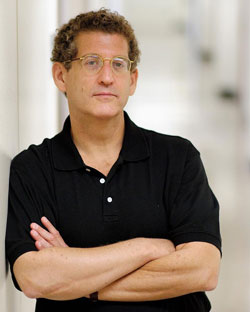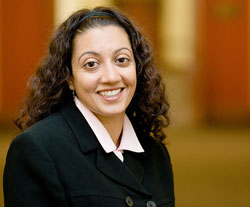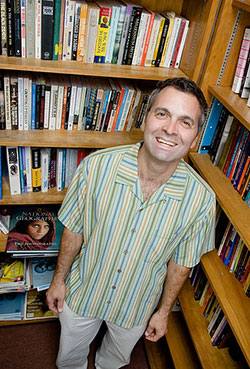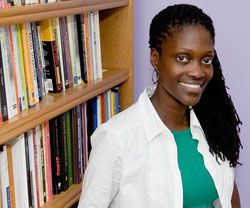New Faces at TC
Monisha Bajaj
Assistant Professor of Education, Department of International & Transcultural Studies
It was her contact through Human Rights Watch with a woman who had been psychologically damaged from torture and rape that first got Monisha Bajaj interested in human rights education for young people. "I thought there had to be a way to prevent abuses before they occur," she says.
One study Bajaj did involved designing a human rights course for eighth graders in the
Before coming to Teachers College last year as a lecturer in the Department of International and Transcultural Studies, Bajaj developed a curriculum for a three-week summer institute for 30
Bajaj, whose grandmother was only permitted to receive a fifth-grade formal education in colonial
At TC, Bajaj will be teaching fundamental concepts of peace education, education and the development of nations, and an advanced seminar on issues in international educational development.
William Gaudelli
Associate Professor of Social Studies and Education
His early experiences traveling and working in communities in
"It seems evident to realize how important it is that people have a broader sense of themselves," he says of his desire to bring divergent perspectives of globalization into the classroom. "Yet we do so little of that in teacher education." His task, as he sees it, is to "engage in a dialogue with teacher candidates so they can do the same with their students."
Gaudelli comes to TC from the
In his new role at TC, Gaudelli would like to further explore the ways that exemplary high school and middle school programs bring global issues into the curriculum. "I'm trying to get a lay of the landscape about what is going on in the city and surrounding areas," he explained, noting that he'll be looking for schools that demonstrate the best practices in teaching social justice, globalization and democratic ethos.
His interest in democratic practices stems back to a personal inclination towards politics and policy and a stint as an intern working in both Congressional and Presidential campaigns. "I'm interested more in politics and policy and less in bureaucratization-'"I want to explore how to build democratic spaces in a school or community," he says, adding that he is suspicious of the use of the term "democratic classroom" these days. He defines it as "being more about building connections between people so that they can see the potential for social cohesion through the classroom."
Valerie Kinloch
Assistant Professor of English Education in the English Education Program
June Jordan is Professor Valerie Kinloch's "American Idol." Born to West Indian immigrant parents in Harlem in the 1930s,
"June Jordan is speaking to where I am right now," Kinloch said recently. "She took activism to different places and different countries-'"talking about
Kinloch, who has been at Teachers College for three years as a term professor, has spent some of that time writing about
"I start with her because the training for my Ph.D. did not include June Jordan or women writers in the academy, or women activists in general," Kinloch explained. "It was more traditional training on literature and educational theories, and there was a large gap of women writers or women writers of color."
In much the same way that
Kinloch would like to work in public high schools and middle schools, as sites of literacy where activism is already happening, to get young people to work on critical and analytical writing skills in ways that are not simply related to school work.
"TC is so centrally located that to not go into the surrounding community is to fail to reach out to people right in front of us," she said.
In June, Kinloch received a Spencer Foundation research grant to work with students and teachers in
Russell Rosen
Assistant Professor of Education in the Teaching of American Sign Language as a Foreign Language Program
The men in Russell Rosen's life when he was young were mostly medical doctors, and he fully expected to join their ranks. He even read their medical textbooks and was fascinated by the surgical techniques they revealed.
All that changed when he transferred to a regular public school after attending a school for the deaf from kindergarten through eighth grade. "Culture shock," he says describing the switch. "Different mannerisms, different expectations-'"not only in terms of modality, but the way people talked was so different." From that point on, he lost interest in medicine and became completely intrigued by culture and anthropology-'"human similarities and differences. He even met famed anthropologist Margaret Mead in his junior year when she gave a presentation to high school students in
In a time before laws required schools to provide services for people with differing abilities, Rosen figured out his own ways to get through public high school as a deaf student, including additional readings and meetings with teachers. He went on to study anthropology at the
Although his initial interest in anthropology was based on his experience as a deaf student in a hearing school, Rosen had no interest in studying deaf communities until he came to
It helped that Rosen had been teaching American Sign Language since the age of 18 as a means to educate the public about sign language and the deaf community and its culture, and to make some money on the side.
Although Rosen has been at Teachers College since 2000 as an adjunct assistant professor and co-coordinator of the Program in the Teaching of American Sign Language as a Foreign Language, his new status as an assistant professor gives him the opportunity to contribute more to the program.
"I want to facilitate development of disability studies and promote positive interactions between disabled and non-disabled individuals-'"deaf and non-deaf," he says. "And I want to expand the program to a doctoral program to allow for more research opportunities in the areas of second-language learning and of equity." Rosen explained that TC has the only functioning program that prepares people to become teachers of ASL with the opportunity to become state certified.
"Teaching ASL as a first language and as a second language are two different things," he explains. People learning ASL as a first language are normally children learning to name concrete objects, define things, and state their thoughts, desires and needs. Second-language learners of ASL already have the foundation of at least one other language. While second-language learners still need to be able to name things and express their ideas in their second language, they also need to shift away from their first language to develop the skills that will allow them to learn ASL.
Rosen says that other colleges are interested in setting up similar programs but lack qualified people to teach in them. "That is what made me think about setting up a doctoral program to help prepare future leaders in the field who would then set up more teacher preparation programs at the college level," he says. In the meantime, he hopes to use the existing program as a model for teachers from outside of
Published Monday, Sep. 18, 2006



